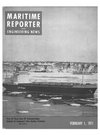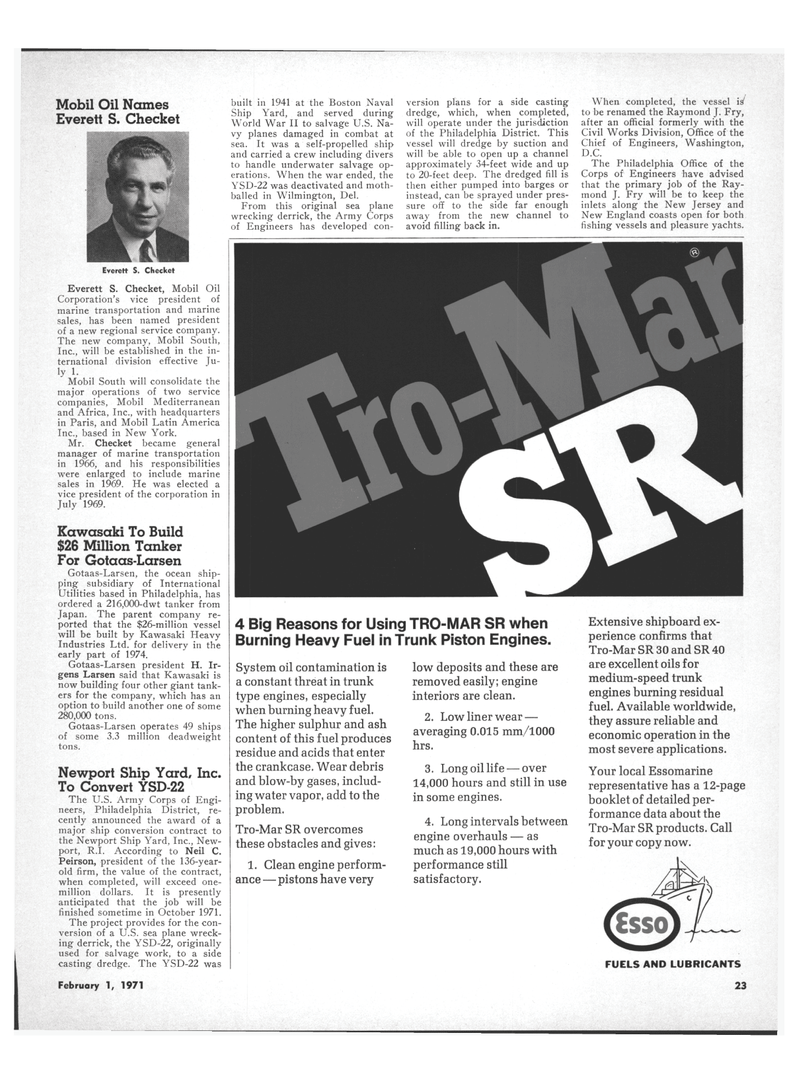
Page 21: of Maritime Reporter Magazine (February 1971)
Read this page in Pdf, Flash or Html5 edition of February 1971 Maritime Reporter Magazine
Mobil Oil Names
Everett S. Checket
Everett S. Checket
Everett S. Checket, Mobil Oil
Corporation's vice president of marine transportation and marine sales, has been named president of a new regional service company.
The new company, Mobil South,
Inc., will be established in the in- ternational division effective ju- ly l.
Mobil South will consolidate the major operations of two service companies, Mobil Mediterranean and Africa, Inc., with headquarters in Paris, and Mobil Latin America
Inc., based in New York.
Mr. Checket became general manager of marine transportation in 1966, and his responsibilities were enlarged to include marine sales in 1969. He was elected a vice president of the corporation in
July 1969.
Kawasaki To Build $26 Million Tanker
For Gotaas-Larsen
Gotaas-Larsen, the ocean ship- ping subsidiary of International
Utilities based in Philadelphia, has ordered a 216,000-dwt tanker from
Japan. The parent company re- ported that the $26-million vessel will be built by Kawasaki Heavy
Industries Ltd. for delivery in the early part of 1974.
Gotaas-Larsen president H. Ir- gens Larsen said that Kawasaki is now building four other giant tank- ers for the company, which has an option to build another one of some 280,000 tons.
Gotaas-Larsen operates 49 ships of some 3.3 million deadweight tons.
Newport Ship Yard, Inc.
To Convert YSD-22
The U.S. Army Corps of Engi- neers, Philadelphia District, re- cently announced the award of a major ship conversion contract to the Newport Ship Yard, Inc., New- port, R.I. According to Neil C.
Peirson, president of the 136-year- old firm, the value of the contract, when completed, will exceed one- million dollars. It is presently anticipated that the job will be finished sometime in October 1971.
The project provides for the con- version of a U.S. sea plane wreck- ing derrick, the YSD-22, originally used for salvage work, to a side casting dredge. The YSD-22 was built in 1941 at the Boston Naval
Ship Yard, and served during
World War II to salvage U.S. Na- vy planes damaged in combat at sea. It was a self-propelled ship and carried a crew including divers to handle underwater salvage op- erations. When the war ended, the
YSD-22 was deactivated and moth- balled in Wilmington, Del.
From this original sea plane wrecking derrick, the Army Corps of Engineers has developed con-
System oil contamination is a constant threat in trunk type engines, especially when burning heavy fuel.
The higher sulphur and ash content of this fuel produces residue and acids that enter the crankcase. Wear debris and blow-by gases, includ- ing water vapor, add to the problem.
Tro-Mar SR overcomes these obstacles and gives: 1. Clean engine perform- ance — pistons have very version plans for a side casting dredge, which, when completed, will operate under the jurisdiction of the Philadelphia District. This vessel will dredge by suction and will be able to open up a channel approximately 34-feet wide and up to 20-feet deep. The dredged fill is then either pumped into barges or instead, can be sprayed under pres- sure off to the side far enough away from the new channel to avoid filling back in. low deposits and these are removed easily; engine interiors are clean. 2. Low liner wear — averaging 0.015 mm/1000 hrs. 3. Long oil life — over 14,000 hours and still in use in some engines. 4. Long intervals between engine overhauls — as much as 19,000 hours with performance still satisfactory.
When completed, the vessel is* to be renamed the Raymond J. Fry, after an official formerly with the
Civil Works Division, Office of the
Chief of Engineers, Washington,
D.C.
The Philadelphia Office of the
Corps of Engineers have advised that the primary job of the Ray- mond J. Fry will be to keep the inlets along the New Jersey and
New England coasts open for both fishing vessels and pleasure yachts.
Extensive shipboard ex- perience confirms that
Tro-Mar SR 30 and SR 40 are excellent oils for medium-speed trunk engines burning residual fuel. Available worldwide, they assure reliable and economic operation in the most severe applications.
Your local Essomarine representative has a 12-page booklet of detailed per- formance data about the
Tro-Mar SR products. Call for your copy now.
FUELS AND LUBRICANTS 4 Big Reasons for Using TRO-MAR SR when
Burning Heavy Fuel in Trunk Piston Engines.
February 1, 1971 23

 20
20

 22
22
